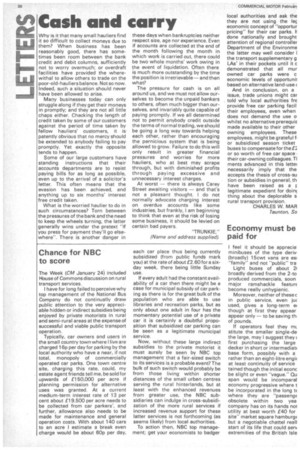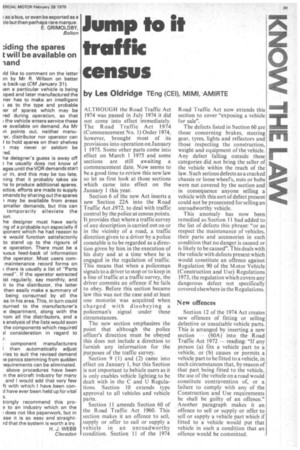Cash and carry
Page 40

Page 41

If you've noticed an error in this article please click here to report it so we can fix it.
Why is it that many small hauliers find it so difficult to collect moneys due to them? When business has been reasonably good, there has sometimes been room between the bank credit and debit columns, sufficiently not to worry overmuch; or overdraft facilities have provided the wherewithal to allow others to trade on the poor-old-hauliers balance. Not so now. Indeed, such a situation should never have been allowed to arise.
Many businesses today can only struggle along if they get their moneys in promptly; and they are not all little chaps either. Checking the length of credit taken by some of our customers against the period of time taken by fellow hauliers' customers, it is patently obvious that no mercy should be extended to anybody failing to pay promptly. Yet exactly the opposite tends to happen.
Some of our large customers have standing instructions that their accounts departments are to resist paying bills for as long as possible, even up to the arrival of a solicitor's letter. This often means that the evasion has been achieved, and anything up to six months' interest free credit taken.
What is the worried haulier to do in such circumstances? Torn between the pressures of the bank and the need to keep the wheels turning, the latter generally wins under the pretext "if you press for payment they'll go elsewhere". There is another danger in
Chance for NBC to score
The Week (CM January 24) included House of Commons discussion on rural transport services.
I have for long failed to perceive why top management of the National Bus Company do not continually draw public attention to the very appreciable hidden or indirect subsidies being enjoyed by private motorists in rural and semi-rural areas at the expense of successful and viable public transport operation.
Typically, car owners and users in the small country town where I live are charged 16p per day for parking by the local authority who have a near, if not total, monopoly of commercially operated car parks. One town centre site, charging this rate, could, my estate agent friends tell me, be sold for upwards of £150,000 per acre if planning permission for alternative uses was granted. At a current medium-term interest rate of 13 per cent about £19,500 per acre needs to be collected from car parkers', and further, allowance also needs to be made for maintenance and general operation costs. With about 140 cars to an acre I estimate a break even charge would be about 60p per day, these days when bankruptcies neither respect size, age nor experience. Even if accounts are collected at the end of the month following the month in which work is carried out, there could be two whole months' work owing in the event of liquidation. Often there is much more outstanding by the time the position is irretrievable— and then what?
The pressure for cash is on all around us, and we must not allow ourselves to become the unpaid bankers to others, often much bigger than ourselves, and invariably quite capable of paying promptly. If we all determined not to permit anybody credit outside the terms of normal trading, we should be going a long way towards helping each other, rather than encouraging the pernicious system that is being allowed to grow. Failure to do this will only result in greater financial pressures and worries for more hauliers, who at best may scrape through, but with diminished profits through paying excessive and unnecessary interest charges.
At worst — there is always Carey Street awaiting visitors — and that's not a pleasant thought. I do not normally advocate charging interest on overdue accounts like some industries, but frankly, I am beginning to think that even at the risk of losing some business, it should be levied on certain bad payers.
-TRUNKIE.," (Name and address supplied).
each car place thus being currently subsidized (from public funds mark you) at the rate of about £2.60 for a sixday week, there being little Sunday use.
If every adult had the constant availability of a car then there might be a case for municipal subsidy of car parking as there is for the great bulk of the population who are able to use libraries and recreation parks, but as only about one adult in four has the momentary potential use of a private car it is certainly a doubtful proposition that subsidized car parking can be seen as a legitimate municipal service.
Now, without these large indirect subsidies to the private motorist it must .surely be seen by NBC top management that a fair-sized switch to its services is a probable event? The bulk of such switch would probably be from those living within shorter distances of the small urban centres serving the rural hinterlands, but at least with the enhanced revenues from greater use, the NBC subsidiaries can indulge in cross-subsidization of the more rural services if increased revenue support for these latter services is not forthcoming (as seems likely) from local authorities.
To action then, NBC top management; get your economists to badger
local authorities and ask the they are not using the lec economic concept of "opportur pricing" for their car parks. 11 done nationally and brought attention of regional controller Department of the Environme the latter may well consider I the transport supplementary g LAs' in their pockets until it c demonstrated that all mur owned car parks were c economic levels of opportunii based on alternative land-use r And in conclusion, on a issue, trade unions might car told why local authorities fre provide free car parking facil their employees, even when does not demand the use a whilst no alternative prerequis made .available to their other owning employees. These employees, might be grateful f, or subsidized season ticket buses to compensate for the or so worth of free car space their car-owning colleagues. TI ments advanced in this lettei necessarily imply that the accepts the thesis of cross-su tion or subsidies in general, th have been raised as a r legitimate expedient for claire thing about the deplorable s rural transport provision. CHARLES W. MAR Taunton, So
Economy must be paid for
I feel it should be apprecia minibuses of the type deriv. (broadly) 15cwt vans are es: "family" and not "public" tra Light buses of about 21 broadly derived from the 2-to produced commercials, soon major ramshackle featurt become really unhygienic.
Moreover, neither of these c in public service, even juc used, gives a long-term ei though at first they appear appear only — to be saving th, of pounds.
If operators feel they mt stitute the smaller single-de the large, may I suggest they r first purchasing the large decker in short or intermediae base form, possibly with a rather than an eight-litre engii at least continuity of service tamed though the initial econc be slight or even "vague." Qu span would be incornparal economy progressive where t be incorporated in the long tt where they are "passengt obsolete within two yea company has on its hands no1 utility at best worth £40 for site" market square hamburgt but a negotiable chattel reall start of its life that could sell extremities of the British Isle ; as a bus, or even be exported as a )Ie but then perhaps rare marque. E. GRIMOLDBY, Bolton
:iding the spares twill be available on land
iId like to comment on the letter )n by Mr R. Wilson on better iS back-up (CM January 31).
ien a particular vehicle is being oped and later manufactured the ner has to make an intelligent ; as to the type and probable ler of spares which may be red during operation, so that I the vehicle enters service these )e available on demand. As Mr in points out, neither menuer, distributor nor operator can to hold spares on their shelves may never or seldom be
.ed.
he deisgner's guess is away off t he usually does not know of ages until the VOR demands start ur in, and this may be too late, fling that it probably takes six is to produce additional spares. ictice, efforts are made to supply )mands by sharing out the spares may be available from areas smaller demands, but this can temporarily alleviate the ion.
he designer must have early Ing of a probable run especially if iponent which he had reason to 'e would function satisfactorily to stand up to the rigours of e operation. There must be a 'luaus feed-back of information the operator. Most users corn maintenance record forms on there is usually a list of "Parts imed'. If the operator extracted ist regularly, say monthly, and it to the distributor, the latter then easily make a summary of being consumed by all the
es in his area. This, in turn could iturned to the manufacturer's e department, along with the .rem all the distributors, and a a analysis of the lists would soon the components which required )1 consideration in regard to t.
component manufacturers
I then automatically adjust ries to suit the revised demand ie panics stemming from sudden .equirements can be eliminated.
above procedures have been n the aircraft industry for many and I would add that very few ft with which I have-been cond have ever been held up for vital s.
trongly recommend this prop to an industry which on the does not like paperwork, but in ase it is so easy and straightrd that the system is worth a try. H. J. WEBB Clevedon




























































































